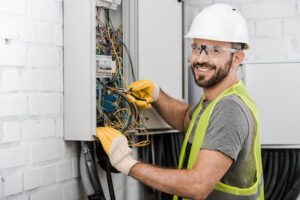
10 Questions to Ask Before Hiring an Electrician for Your Next Project
Hiring an electrician can be a daunting task, especially if you’re not familiar with the intricacies of electrical work. Whether you’re planning a major renovation, installing new lighting, or simply need some repairs, it’s crucial to find a qualified professional who can ensure the job is done safely and correctly. But how do you know if an electrician is the right fit for your project? Asking the right questions can help you make an informed decision. Here are the top 10 questions to ask before hiring an electrician for your next project.
1. Are You Licensed and Insured?
One of the first and most important questions to ask any electrician is whether they are licensed and insured. A valid license ensures that the electrician has undergone the necessary training and meets the standards set by your local or state regulatory authority. It’s a fundamental assurance of their competence and professionalism.
Why It Matters
Licensing shows that the electrician is qualified to perform electrical work safely and in compliance with building codes. Insurance protects you from liability in case of accidents or damage to your property during the job. Without these protections, you could be left with costly repairs or legal issues if something goes wrong.
What to Look For
- License Number: Ask for the electrician’s license number and verify it with your local licensing authority.
- Insurance Proof: Request a copy of their insurance certificate. Ensure they have both general liability insurance and workers’ compensation coverage.
2. How Much Experience Do You Have?
Experience matters a lot in the electrical industry. An experienced electrician is more likely to have encountered a variety of problems and knows how to solve them efficiently. They can provide insights and suggestions that a less experienced electrician might not consider.
Why It Matters
Experience translates to expertise. An experienced electrician will be familiar with the latest technologies and best practices in the field. They are also more likely to complete the job correctly the first time, saving you time and money.
What to Look For
- Years in Business: Ask how long they have been working as an electrician.
- Specific Experience: Inquire about their experience with projects similar to yours.

3. Can You Provide References?
A reputable electrician should be able to provide references from past clients. Speaking with previous customers can give you a sense of the electrician’s reliability, work quality, and professionalism.
Why It Matters
References provide firsthand accounts of what it’s like to work with the electrician. They can offer valuable insights into the electrician’s punctuality, communication skills, and overall satisfaction with the job.
What to Look For
- Recent References: Ask for references from recent projects to ensure their skills and practices are up-to-date.
- Variety of Projects: Look for references from a range of project types, if possible, to get a broader perspective on their capabilities.
4. What Services Do You Offer?
Electricians often specialize in different areas, such as residential, commercial, or industrial work. It’s important to confirm that the electrician you’re considering has experience with the type of work you need.
Why It Matters
Hiring an electrician with the right expertise ensures that they are familiar with the specific requirements and challenges of your project. This can lead to a smoother, more efficient job.
What to Look For
- Range of Services: Ask about the types of services they offer. Do they handle installations, repairs, maintenance, or upgrades?
- Specializations: Inquire if they have any specializations, such as home automation, renewable energy systems, or commercial electrical work.

5. Can You Provide an Estimate?
Before any work begins, it’s essential to get a detailed estimate of the costs involved. A professional electrician should be able to provide a written estimate after evaluating the scope of the project.
Why It Matters
An estimate helps you budget for the project and ensures there are no surprises when the bill arrives. It also allows you to compare quotes from different electricians to find the best value for your money.
What to Look For
- Detailed Breakdown: The estimate should include a detailed breakdown of labor, materials, and any other costs.
- Potential Additional Costs: Ask about any potential additional costs that might arise during the project.
6. What is Your Availability?
Electrical issues can sometimes be urgent, and it’s important to know when the electrician will be available to start and complete the work. Ask about their current workload and how soon they can begin your project.
Why It Matters
Knowing the electrician’s availability helps you plan your project timeline and ensures that your electrical issues are addressed promptly. Delays can be inconvenient and may even pose safety risks.
What to Look For
- Start and Completion Dates: Ask for an estimated start date and project duration.
- Emergency Services: Inquire if they offer emergency services and their response time for urgent issues.
7. Who Will Be Performing the Work?
It’s common for larger electrical companies to have multiple electricians on staff. It’s important to know who will be performing the work on your project and their qualifications.
Why It Matters
You want to ensure that the person working on your project is experienced and qualified. If the company sends an apprentice or less experienced electrician, confirm that they will be supervised by a licensed professional.
What to Look For
- Team Composition: Ask about the team that will be working on your project and their roles.
- Qualifications: Confirm the qualifications and experience of the individuals performing the work.

8. Do You Offer a Warranty?
A warranty provides peace of mind that the work will be done correctly and that any issues will be addressed without additional cost. Ask about the warranty on both labor and materials.
Why It Matters
A warranty demonstrates the electrician’s confidence in their work and commitment to quality. It also protects you from additional costs if problems arise after the project is completed.
What to Look For
- Labor Warranty: Ask about the duration and coverage of the warranty on labor.
- Material Warranty: Inquire if there are warranties on the materials used and the duration of these warranties.
9. How Do You Handle Permits and Inspections?
Many electrical projects require permits and inspections to ensure compliance with local building codes. Ask if the electrician will handle the permit process and coordinate inspections.
Why It Matters
Permits and inspections are critical for ensuring the safety and legality of your electrical work. A professional electrician should be familiar with the local regulations and handle this process for you.
What to Look For
- Permit Handling: Confirm that the electrician will obtain all necessary permits.
- Inspection Coordination: Ask if they will schedule and coordinate any required inspections with local authorities.
10. How Do You Ensure Safety?
Safety is paramount when it comes to electrical work. Ask about the safety measures and protocols the electrician follows to protect both themselves and your property.
Why It Matters
Electrical work can be dangerous, and proper safety protocols are essential to prevent accidents and injuries. Ensuring that the electrician prioritizes safety can give you confidence in their professionalism and care.
What to Look For
- Safety Procedures: Ask about the safety procedures they follow on the job.
- Protective Equipment: Inquire about the protective equipment they use to ensure safety.

Hiring the right electrician for your next project is crucial to ensure the work is done safely, correctly, and efficiently. By asking these 10 essential questions, you can gain a better understanding of the electrician’s qualifications, experience, and professionalism. This will help you make an informed decision and choose the best professional for your needs.
Common Electrical Projects and Maintenance Tips
Understanding the types of electrical projects you might encounter and how to maintain your electrical systems can help you communicate effectively with your electrician and keep your home safe. Here are some common electrical projects and essential maintenance tips.
Common Electrical Projects
Rewiring an Older Home
Rewiring an older home is a significant but necessary project to ensure safety and compliance with modern electrical standards. Old wiring can pose a fire hazard and may not support the electrical demands of today’s appliances and devices.
- Hire a licensed electrician experienced with older homes.
- Expect the project to involve opening walls and ceilings, which might require additional repairs.
- Plan for temporary disruptions to your home’s electrical service.
Upgrading the Electrical Panel
Upgrading your electrical panel increases the capacity to handle additional circuits and modern electrical loads. This is essential if you’re adding new appliances, building an extension, or installing a home office.
- Ensure the new panel meets your future electrical needs, not just current ones.
- Consider including surge protection to safeguard against power surges.
Installing New Lighting
Installing new lighting can enhance the aesthetics and functionality of your home. Projects can range from simple fixture replacements to complex installations like recessed lighting or outdoor landscape lighting.
- Choose energy-efficient LED fixtures to reduce energy consumption.
- Consider smart lighting systems for added convenience and control.

Adding Electrical Outlets
Adding new electrical outlets can make your home more functional and reduce the need for extension cords, which can be a tripping hazard and fire risk.
- Place outlets in convenient locations, including kitchens, bathrooms, and home offices.
- Install GFCI (Ground Fault Circuit Interrupter) outlets in areas prone to moisture, like kitchens and bathrooms, for enhanced safety.
Electrical System Maintenance Tips
Regular maintenance of your electrical system can prevent issues and extend the lifespan of your electrical components. Here are some essential maintenance tips:
Regular Inspections
Schedule regular inspections with a licensed electrician to identify and address potential issues before they become major problems. Inspections should include checking the electrical panel, outlets, switches, and visible wiring.
- Have your electrical system inspected every 3-5 years, or more frequently if you notice any issues.
- Document the inspection results and any repairs or upgrades for future reference.
Testing GFCI Outlets
GFCI outlets are designed to protect against electrical shocks by shutting off power when a ground fault is detected. Regularly test these outlets to ensure they are functioning correctly.
- Press the “Test” button on the outlet, then press the “Reset” button to restore power. If the outlet doesn’t shut off or reset, it needs to be replaced.
- Test GFCI outlets monthly to ensure they are working properly.
Checking for Overloaded Circuits
Overloaded circuits can cause breakers to trip and potentially lead to electrical fires. Be mindful of the electrical load on each circuit, especially in older homes with limited circuits.
- Distribute electrical loads evenly across circuits to avoid overloading.
- Use power strips with surge protection and avoid daisy-chaining multiple power strips together.
Replacing Faulty Outlets and Switches
Outlets and switches can wear out over time, leading to poor connections and potential fire hazards. Replace any outlets or switches that are cracked, discolored, or not working correctly.
- Use high-quality, tamper-resistant outlets for added safety.
- Label the date of replacement on outlets and switches to keep track of their age and condition.
Keeping Electrical Panels Clear
Ensure your electrical panel is easily accessible and free from obstructions. This allows for quick access in case of an emergency and prevents overheating.
- Maintain a clearance of at least 3 feet around the electrical panel.
- Avoid storing flammable materials near the panel.
When to Call an Electrician
Knowing when to call an electrician can prevent minor issues from becoming major problems. Here are some signs that you need professional electrical help:
- Frequent Breaker Trips: If your circuit breakers trip frequently, it could indicate an overloaded circuit or a more serious electrical issue.
- Flickering Lights: Flickering lights can be a sign of loose wiring or a problem with the electrical grid.
- Burning Smell: A burning smell near outlets or switches can indicate overheating or an electrical fire hazard. Turn off the power and call an electrician immediately.
- Sparking Outlets: Outlets that spark when you plug in or unplug devices need to be inspected by a professional.
- Outlets or Switches Not Working: If outlets or switches stop working, it could be a sign of a wiring issue that needs to be addressed.
Maintaining your home’s electrical system is crucial for safety and efficiency. By understanding common electrical projects and following essential maintenance tips, you can keep your home’s electrical system in top condition. When it comes to significant electrical work, hiring a professional electrician ensures the job is done safely and correctly. Use the 10 questions outlined in this blog to find a qualified electrician who meets your needs and provides peace of mind. With the right approach, you can enjoy a safe, functional, and efficient electrical system in your home for years to come.

Leave a Reply